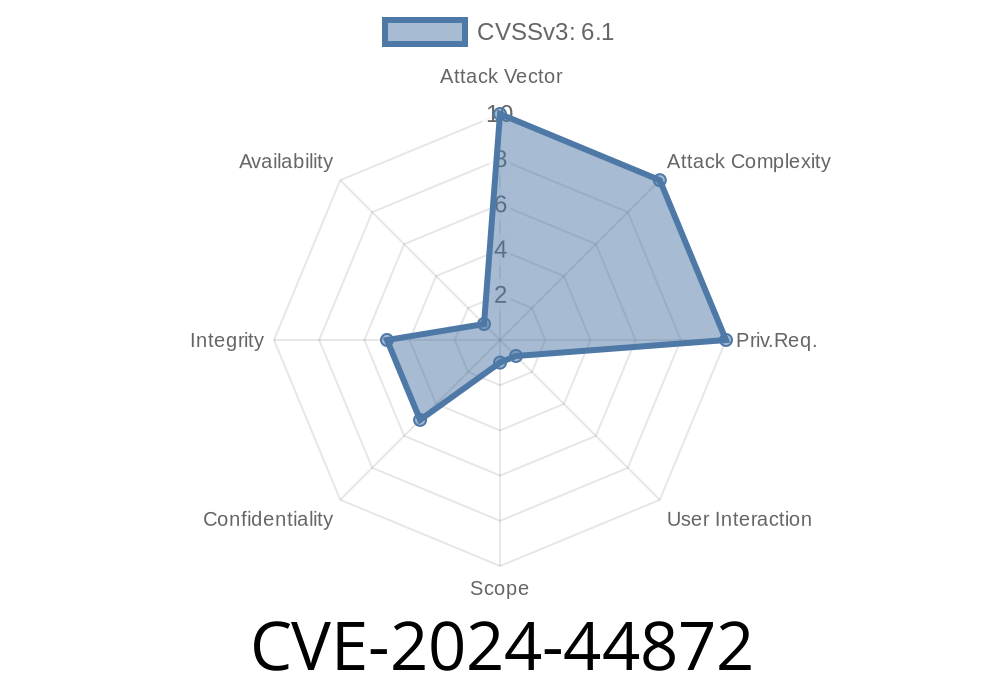moziloCMS is a lightweight content management system (CMS) that's easy to set up and use. However, a new security issue, CVE-2024-44872, was discovered in version 3. of moziloCMS. This vulnerability is a reflected cross-site scripting (XSS) bug, which lets attackers inject malicious code that runs in a user's browser. This post breaks down how the bug works, what an attack looks like, and how you can protect yourself or your website.
What is Reflected Cross-Site Scripting (XSS)?
Reflected XSS is a type of vulnerability where attackers trick users into clicking a specially crafted link. When the victim clicks this link, malicious JavaScript code is sent to the server in a request and immediately reflected back (hence the name) in the response—usually inside a web page. The victim's browser then executes this code, often giving attackers access to cookies, login sessions, or the ability to impersonate the victim.
How the Bug Works
In moziloCMS v3., some user input sent through the URL is not properly sanitized or escaped before it is used in the HTML response. This means an attacker can craft a link containing malicious JavaScript, and when a victim visits the link, the JavaScript is executed in the context of their browser.
Vulnerable Parameter Example
For demonstration, let's say moziloCMS has a search feature where you can search for keywords via the URL:
http://victim-website.com/index.php?suche=keyword
The value from suche is included directly in the page's HTML without escaping special characters.
Here’s a simple example of what an attacker might do. They’d send a victim a link like this
http://victim-website.com/index.php?suche=<script>alert('Hacked!')</script>;
When the victim clicks the link, instead of just searching for <script>alert('Hacked!')</script>, the script tag is reflected back into the HTML, and the browser executes alert('Hacked!').
Here is a basic PHP code snippet that explains the vulnerable behavior
<?php
// index.php
$suche = $_GET['suche'];
echo "You searched for: " . $suche;
?>
If the value in $suche contains HTML or JavaScript, it will be executed by the user's browser.
`
http://victim-website.com/index.php?suche=
Victim clicks the link by email, instant message, or website.
3. The script pops an alert in their browser (or does something more malicious, like stealing cookies or session tokens).
Mitigation: How to Protect Your Site
Developers: Always escape output! In PHP, use htmlspecialchars() before printing user data.
<?php
$suche = htmlspecialchars($_GET['suche'], ENT_QUOTES, 'UTF-8');
echo "You searched for: " . $suche;
?>
Website Operators:
Consider using a Web Application Firewall (WAF).
Users:
References & Further Reading
- CVE-2024-44872 at NVD
- OWASP XSS Cheatsheet
- moziloCMS Official Site
Conclusion
CVE-2024-44872 in moziloCMS v3. is a simple but dangerous XSS bug. Attackers can run arbitrary scripts in your users’ browsers if you don’t sanitize user-supplied input. If you run moziloCMS, double-check your input handling and escape all output.
Stay vigilant, keep your software updated, and spread the word!
*Exclusive write-up for cybersecurity awareness. If you have more questions or need help patching this issue, leave a comment below.*
Timeline
Published on: 09/10/2024 17:15:37 UTC
Last modified on: 09/13/2024 15:26:12 UTC
